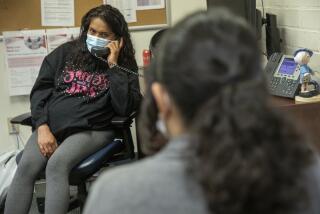Abortion Access Dooms Saddleback Drug Program : Students: On-campus counseling funded by Medi-Cal is canceled because it also offered family planning services.
MISSION VIEJO — A popular high school drug counseling program was canceled last week under pressure from Saddleback Valley Unified School District officials who feared the program could allow students access to abortions and birth control without parental consent.
Saddleback officials said they reluctantly moved against the on-campus drug counseling program because students who receive the Medi-Cal-funded service can also ask on campus for family planning benefits.
“I think it’s a great (drug) program; we want to save it,” said district Supt. Peter Hartman. “But parents have a right to know about an unapproved program that provides abortion. We don’t want to give students a ticket to get condoms.”
The issue of family planning for students was raised during November’s school board election by a candidate who was elected with the support of Orange County anti-abortion groups.
Hartman said the topic was discussed in a board meeting earlier this year. No vote was taken, but he said the board unanimously agreed to oppose allowing students while on campus to seek family planning services without parental knowledge.
A Medi-Cal administrator in Sacramento criticized the district’s action.
The purpose of the Medi-Cal program “is to enable a minor either being deprived of medical care or abused by their family to be able to seek help from the state,” Glenda Arellano said. “That should not be diluted because of the moral stance of one district.”
Arellano said of the district: “They’re making the choice not to have this program. We can feel some regret they made that decision, but they’re the ones who are going to lose out.”
Hartman said he doesn’t know of any student in his district who has obtained an abortion under the five-year-old program that still serves about 1,000 students in other school districts countywide.
In the Saddleback district, the weekly drug counseling sessions ended Thursday for about 150 students who bid an emotional goodby to their counselors.
“There were times when I sat in class, depressed as hell, thinking life is going to end,” said Melanie Browning, 15, an El Toro High School freshman. “Then I’d think: ‘Wait, group (counseling) is tomorrow.’ Losing group makes me so angry, I mean, nobody used (the program) to get abortions. I feel like someone is violating my rights.”
The campus drug counseling service was started by the Orange County Health Care Agency when county officials discovered the Medi-Cal Minor Consent Program. Enacted by the state Legislature 15 years ago, the program pays for youths, starting at age 12, to receive confidential treatment for needs ranging from drug counseling to family planning. Confidentiality is guaranteed to protect any students from abuse by their guardians.
Beside drug counseling and family planning, the state law also provides Medi-Cal funding for treatment of sexual assault victims, venereal disease and mental health care.
Today, the county sends drug counselors to 36 middle schools and high schools in Orange County. To pay for counseling, students each month fill out standard Medi-Cal forms and state eligibility workers visit campus to collect them.
Criticism began last July, Hartman said, when the district began getting anonymous calls from parents who claimed students were receiving Medi-Cal eligibility cards on campus in order to obtain abortions.
He said the accusations were rejected by district counselors and county health workers, but that the rumors persisted.
County workers and students stressed that abortion and birth control were rarely mentioned in drug counseling sessions, and that a vast majority of the students never even asked to receive Medi-Cal cards that allow family planning service.
Then, in late November, Hartman met with William Edelman, a county Health Care Agency administrator, and told him the district didn’t want state eligibility workers on campuses anymore to let students sign up for Medi-Cal unless the coverage was limited to drug counseling.
However, students were still allowed to travel to the Medi-Cal office in Laguna Hills to fill out the monthly forms for continued eligibility.
In practice, though--mostly because of transportation problems--Edelman said only a few students were able to reach the South County office. Student enrollment in Medi-Cal declined, causing the county to lose about $50,000 in state funding for the program.
As a result of school district pressure and the loss of program funding, county health officials were forced to shut down the drug counseling service Thursday.
“Without a chance (for students) to sign up for this on campus,” Edelman said, “funding has gone away. . . . Unfortunately, a number of children who have problems don’t have the means to get to the clinic sites where we are currently located and seek our help.”
Among the students who wanted to requalify for Medi-Cal counseling but couldn’t reach the South County office was El Toro High School senior Carrie Lucas, 17, who doesn’t have a car. With the limited bus services in South County, “it’s hard for me and some of the other kids in group (counseling) to get around.”
“This whole thing is incredibly frustrating,” she said. “It seems like the (district) administration is only taking one point of view about this abortion stuff. We’re just a bunch of people who got together to talk about our problems.”
Having a counselor and peer group “really helped a lot,” Carrie said. “There are things that kids aren’t going to tell their parents and group really helped me work things out.”
Carrie’s mother, Anita Hillyer, said her daughter has improved both emotionally and scholastically since beginning group sessions last fall.
“We’re pretty close, but there were things going on with her that I had no idea were happening,” Hillyer said. “I’ve seen a dramatic turnaround in her grades and her selection of friends.
“I really feel the program saved Carrie,” Hillyer said.
Although Saddleback district officials say they will continue negotiating with state Medi-Cal officials to revive the drug program, both sides seem to have dug in their heels.
Hartman has asked Medi-Cal policy-makers to create a limited category for drug abuse counseling so that students can’t also seek the family planning service.
However, Medi-Cal officials say state law will not permit any restrictions to the Minor Consent Program.
“It’s very difficult to change our policies for all the counties in the state on the basis of one moral issue,” said Arellano of Medi-Cal. “That’s not what drives state policies.”
However, district officials argue that it isn’t against the law to alter Medi-Cal policies.
“I don’t know why they can’t do it; there’s nothing in the law that says you can’t limit the services on a campus that doesn’t want family planning,” Hartman said. “They’re insisting that we have to allow abortions for girls 12 and up to get drug and alcohol counseling.”
Saddleback board members said they also regret the cancellation of drug counseling services.
“I think the entire board is extremely supportive of this very valuable program in regards to the substance abuse counseling,” board President Bobbee Cline said. “But we do not want to have other medical services available to our students, particularly when it might happen without the parents’ knowledge.”
Cline, who described the situation as a “bureaucratic mix-up,” said she is confident the district will reach an agreement with the state.
“I don’t think we’re willing to let this program die,” she said. “We have students who are in need and who are having a need fulfilled wonderfully. We are anxious to see that continue.
“The sad thing is, once again while the adults fiddle around, the kids suffer,” she added.
With the end of the program at Saddleback, counselor Kate Pavich, who worked with students at El Toro and Trabuco Hills high schools, said she has given those in her group bus passes and invitations to drop by at any time at the Health Care Agency clinic in Laguna Niguel.
But as to what will happen to the students without counseling easily available on campus, Pavich can only shake her head and say: “It’s out of my hands.”
During final tear-filled counseling sessions with students, many students said they would fight for the program by circulating a petition and writing letters to district officials, Pavich said.
More to Read
Sign up for Essential California
The most important California stories and recommendations in your inbox every morning.
You may occasionally receive promotional content from the Los Angeles Times.










